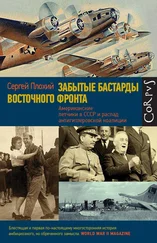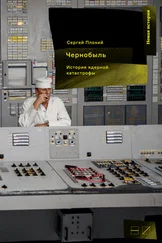It was on my trip to Prypiat that I decided I had to tell the saga of Chernobyl: it would be for the sake of those who were not around at the time but who wanted to know and understand what had happened on that fateful night of April 26, 1986, and in the days, months, and years that followed. Despite the Soviet government’s initial efforts to conceal the Chernobyl disaster and downplay its consequences, it became well known in the Soviet Union and in the West and received a great deal of public attention, starting with journalistic reports filed in the first days after the explosion and ending with documentary films, feature movies, nonfiction investigations, and novels. Although the key to understanding the causes, consequences, and lessons of the disaster is historical contextualization and interpretation, few historians have addressed the subject to date.
This book is a work of history—in fact, it is the first comprehensive history of the Chernobyl disaster from the explosion of the nuclear reactor to the closing of the plant in December 2000 and the final stages in the completion of the new shelter over the damaged reactor in May 2018. As I embarked on my research of the history of Chernobyl, I was helped enormously by the recent opening of previously closed archival collections dealing with the disaster. Many government archives opened their doors more widely than before, making it easier to consult documents issued by the Communist Party and government agencies at the time and in the aftermath of the disaster. The Maidan uprising and the Revolution of Dignity of 2014 in Ukraine also produced an archival revolution that allowed unprecedented access to previously closed KGB files.
I was writing this book both as a historian and as a contemporary of the events being discussed. At the time of the explosion I lived in Ukraine less than 500 kilometers downstream Dnieper of the damaged reactor. My family and I were not directly affected by the ordeal. But a few years later, doctors in Canada, where I was a visiting professor at the time, told me that at some point my thyroid had been inflamed—a worrisome sign of radiation exposure. Fortunately, my wife and children were fine. But radiation acts in unpredictable ways: One of my former university classmates was sent to Chernobyl as a policeman a few days after the accident; he still spends at least a month in the hospital every year. Another university colleague who spent time near the station after the explosion seems to be fine—he now teaches Soviet history in the United States. Talking with them and with other participants in the events and recollecting my own memories of the disaster helped me re-create the thoughts and motives of those who had sacrificed their health, or even their lives, to minimize the consequences of the Chernobyl meltdown.
The further we move in time from the disaster, the more it seems like a myth—and the more difficult it becomes to grasp its real-life roots and consequences. By putting the disaster in historical context, I attempt to provide better understanding of the world’s worst nuclear accident. My use of newly available archival materials and recently published government documents, as well as interviews with eyewitnesses and accounts of other writers, such as Svetlana Alexievich and Yurii Shcherbak, has allowed me to present a long-term perspective on the disaster and its political, social, and cultural effects. In my narrative, I move from the control room of the damaged reactor to the abandoned villages of the exclusion zone and to the offices of those in power in Kyiv (Kiev), Moscow, and Washington. Placing the Chernobyl accident in the context of international history makes it possible to draw lessons of global significance.
Chernobyl as history is the story of a technological disaster that helped bring down not only the Soviet nuclear industry but the Soviet system as a whole. The accident marked the beginning of the end of the Soviet Union: a little more than five years later, the world superpower would fall apart, doomed not only by the albatross of its communist ideology but also by its dysfunctional managerial and economic systems.
The explosion at the Chernobyl nuclear plant had challenged and changed the old Soviet order. The policy of glasnost , or openness, which gave the media and citizens the right to discuss political and social problems and criticize the authorities, had its origins in the post-Chernobyl days. As the population demanded more and more information from the government, the official culture of secrecy slowly yielded. The Chernobyl disaster made the government recognize ecological concerns as a legitimate reason for Soviet citizens to create their own organizations, which broke the monopoly of the Communist Party on political activity. The first Soviet-era mass organizations and political parties began in the ecological movement, which engulfed the heavily polluted industrial centers of the Soviet Union.
Because radiation affected everyone, from party leaders to ordinary citizens, the Chernobyl accident also sharply increased discontent with Moscow and its policies across ethnic and social lines. Nowhere was the political impact more profound than in Ukraine, the republic that was home to the failed reactor. Two conflicting political actors in Ukraine—the Ukrainian communist establishment and the nascent democratic opposition—discovered a common interest in opposing Moscow, and especially Soviet leader Mikhail Gorbachev. In December 1991, when Ukrainians voted for their country’s independence, they also consigned the mighty Soviet Union to the dustbin of history—it was officially dissolved a few weeks after the Ukrainian referendum. While it would be wrong to attribute the development of glasnost in the Soviet Union, or the rise of the national movement in Ukraine and other republics, to the Chernobyl accident alone, the disaster’s impact on those interrelated processes can hardly be overstated.
It would be easy to blame the Chernobyl accident on the failed communist system and the design flaws of Chernobyl-type reactors, implying that those problems belong to the past. But this confidence would be misplaced. The causes of the Chernobyl meltdown are very much in evidence today. Authoritarian rulers pursuing enhanced or great-power status—and eager to accelerate economic development and overcome energy and demographic crises, while paying lip service to ecological concerns—are more in evidence now than they were in 1986. Could the nuclear Armageddon called Chernobyl repeat itself? No one knows the answer to this question. But there is no doubt that a new Chernobyl-type disaster is more likely to happen if we do not learn the lessons of the one that has already occurred.

Prologue
Around 7:00 a.m. on April 28, 1986, Cliff Robinson, a twenty-nine-year-old chemist working at the Forsmark Nuclear Power Plant two hours’ drive from Stockholm, went to brush his teeth after breakfast. In order to get from the washroom to the locker room, he had to pass through a radiation detector, just as he had done thousands of times before. This time was different, though—the alarm went on. It made no sense, thought Robinson, as he had never even entered the control area, where he might have absorbed some radiation. He went through the detector a second time, and again it went on. Only on the third try did the alarm fall silent. Finally, an explanation—the damned thing had simply malfunctioned.
Robinson’s job at the plant was monitoring radiation levels: how ironic, he thought, that the detector had chosen him to show how vigilant the system was. Good thing it had come back to its senses. Robinson went on with his duties, all but forgetting the unexpected alarm. But when he returned to the area later that morning, he saw a line of workers who also could not pass the detector without setting it off. Instead of checking the alarm, Robinson took a shoe from one of those waiting near the detector and took it to the lab for examination. What he discovered sent shivers up his spine. “I saw a sight that I will never forget,” he recalled. “The shoe was highly contaminated. I could see the spectrum rising very quickly.”
Читать дальше
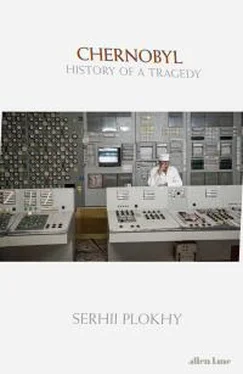


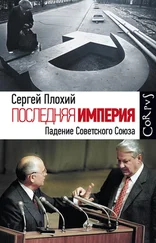



![Сергей Плохий - Чернобыль - История ядерной катастрофы [litres]](/books/385171/sergej-plohij-chernobyl-istoriya-yadernoj-katastrof-thumb.webp)
![Сергей Плохий - Человек, стрелявший ядом [История одного шпиона времен холодной войны]](/books/405163/sergej-plohij-chelovek-strelyavshij-yadom-istoriya-od-thumb.webp)

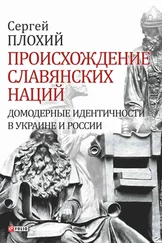
![Сергей Плохий - Потерянное царство. Поход за имперским идеалом и сотворение русской нации [c 1470 года до наших дней]](/books/433093/sergej-plohij-poteryannoe-carstvo-pohod-za-impersk-thumb.webp)
